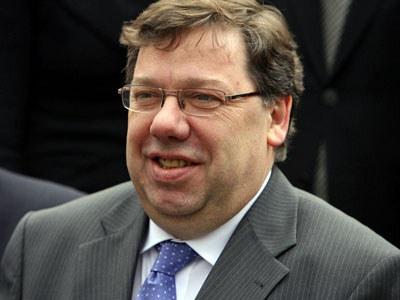Cowen was centrally responsible for crises in economy

Brian Cowen’s 50th birthday on Sunday must have been marked with less than euphoric celebration of his life achievements to date, although the achievements are substantial. To become prime minister of one’s country is a significant accomplishment and he has many qualities of a fine person and, I am sure, a good father, husband and friend.
But politically, aside from the attainment of high office, his achievements are not noteworthy. I can’t think of any significant achievement of his in any of the portfolios he held: as minister for labour (1992-1994), minister for health (1997-2000), minister for foreign affairs (2000-2004), minister for finance (2004-2008) and Taoiseach (2008 to date).
But then, what political figure has achieved anything of note as a ministerial office-holder? Yes Bertie on Northern Ireland and perhaps as president of the EU Council. Micheál Martin’s smoking ban was worthwhile and he has been so fortunate in the contrast between his tenure in health and that of his successor there. I am sure (hope?) some other ministers did something of note at some stage, but they don’t spring to mind immediately. The best that can be hoped for in most instances is that they don’t do too much harm.
Regrettably, that is not true in the case of Brian Cowen. He has done too much harm. He was centrally responsible for the crises we have in the economy and in banking. Yes, there were international factors but we would have had an economic and banking crisis here anyway. He overheated the economy at a time when prudent action would have required that the Celtic Tiger boom be dampened down.
He contributed to the property bubble (although he resisted the madcap pressure to boost that bubble further by removing stamp duty), and he averted his eyes from the unfolding crisis in the banks. It is just not believable that he was never alerted to the recklessness that was rampant in Anglo Irish Bank and that was emerging in the other banks.
His defence to all this is (a) others would have done more damage, for Fine Gael, Labour and others were urging him to even greater fiscal recklessness; (b) he was not the banks’ keeper – that was the role of the regulator and of the Central Bank.
Some defence.
And he then compounded these harms as Taoiseach by presiding over a series of initiatives, instigated by his ablest lieutenant, Brian Lenihan, that, in my view, has done and will do terrible damage: the bank guarantee, Nama and the budgets. These have gravely deepened inequality here and have caused and will cause great misery across a swathe of society.
The excessive bank guarantee and bailout will cost probably between €10 billion and €20 billion in time and, the burden will fall on the would-be recipients of social welfare, health care and education. The budgets have already damaged health and education and have targeted the poor and the organisations of the poor with ravaging effect.
And this has been done by a man who, essentially, is decent, compassionate, clever and able. The explanation for this apparent contradiction is his politics, or rather his ideology. Brian Cowen, I suspect, would be dismissive of any ideology ascribed to him. He perceives himself, I suspect, as being ideologically free, devoid of such “hang-ups”.
Regrettably (or is it regrettable?) we are all suffused with ideological hang-ups and that has ever been the fate of humankind. For instance, our ancestors saw slavery as part of the normal order of society and, until recently, people thought it was part of God’s design that women were subordinate to men. Nowadays we see nothing wrong or even bizarre that societies’ resources are distributed in a way that is massively unequal, not just on a global scale but within individual societies.
Such inequalities, it is contended, are inevitable, part of the natural order, and indeed an essential motivator to ensure the prosperity of society or at least of the upper tier of society.
Brian Cowen is more able than most in politics, although his confidence seems to have been shattered these past 18 months. He may be removed as leader of his party and Taoiseach as he is perceived as an electoral liability.
But even if this does not happen, the common assumption that he and his party are doomed to humiliation in the next election seems to me misplaced. And anyway, what difference would it make if the other crowd replaced the present crowd? They all have the same hang-ups.
Finally, a belated happy birthday.
